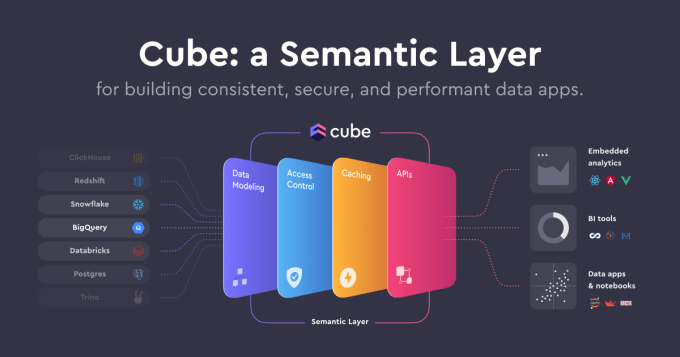
A growing number of businesses are embracing data models — abstract models that organize elements of data and standardize how they relate to one another. But as the data analytics and AI boom drives organizations to expect more of data models, many of the old paradigms are proving difficult to manage — and are exceptionally brittle.
At least, that’s what engineers and entrepreneurs Artyom Keydunov and Pavel Tiunov observed in their work. While at Statsbot, a data analytics startup the pair co-founded in 2016, Keydunov and Tiunov often consulted with organizations struggling to get their “data house,” so to speak, in order.
Cube began as an open source project in 2019 offering what Keydunov describes as a “universal semantic layer” for organizational data that can feed into databases, business intelligence (BI) tools, and even AI-powered chatbots. Now, five years later, Keydunov and Tiunov have a veritable business on their hands, having launched a subscription-based service built on Cube — Cube Cloud — that adds automated workflows and enterprise-focused governance and deployment tooling.
“There’s no shortage of data,” Keydunov told TechCrunch. “And the demand for data continues to grow among employees, partners and customers, who are motivated by the idea that data-driven decisions lead to improved operational efficiency, enhanced customer satisfaction and competitive advantage. Technologies like AI, machine learning, the Internet of Things and blockchain are reshaping the data landscape and revolutionizing how organizations collect, process, and derive value from data. It’s not only humans who need data; now machines need data too.”
Data modeling challenges aside, surveys suggest that relatively few orgs are achieving even base-level success deriving value from their data. A 2022 Gartner poll of data analytics leaders found that fewer than half believe their teams are effective in providing value to their employers. That’s despite the fact that, according to the same poll, companies are spending an average of over $5 million on data management, governance and analytics initiatives.
So what to do? For Keydunov and Tiunov, the answer was to try and create a platform that could serve as a unified source of truth for all a company’s data and metrics.

“Cube Cloud is a universal semantic layer that is an independent, yet interoperable, part of the modern data stack that sits between your data sources and data consumers,” Keydunov said. “The universal semantic layer allows every data endpoint — whether it is BI tools, embedded analytics, or AI agents and chatbots — to work with the same semantics and underlying data.”
Companies use Cube Cloud to build that semantic layer and connect it to their various apps and utilities, employing role-based access controls, data caching, single sign-on, and scaled-up infrastructure as they require it. Enterprise-tier customers get access to consultants who can train their data engineers to work with Cube Cloud and offer support on-demand, as well as build the initial Cube Cloud instance — either on Cube-owned servers or on-premises — customized to the business.
“Cube Cloud automatically adjusts queries and injects the appropriate security context — user or role details — to make sure that only the appropriate users have access,” adds Keydunov. “And through the performance insights in Cube, customers can find redundant queries or other opportunities for caching and pre-aggregating query results, reducing the amount of compute that is required.”
Cube competes with AtScale, which also offers a semantic layer for data modeling and serving, and Dtb Labs’ recently acquired Transform. But Cube appears to be holding its own, with a customer base that spans over 200 Fortune 1000 brands and a user base approaching 5 million people, the firm says.
Keydunov says that the open source Cube project has surpassed 10 million downloads, while Cube Cloud is now installed on around 90,000 servers. Bookings are up 3x from 2023 to 2024, while the average deal size has grown 3x.
It’s this success that attracted new investment to the business, no doubt. San Francisco-based Cube this week announced it raised $25 million in funding from backers, including Databricks Ventures, Decibel, Bain Capital Ventures, Eniac Ventures and 645 Ventures. Bringing the 40-employee startup’s total raised to $48 million, the new cash will be put toward supporting Cube’s go-to-market and marketing activities and broadening Cube Cloud’s capabilities, Keydunov said.
“Our investors encouraged us to raise equity in order to support the expansion of our go-to-market team so that we could take advantage of the huge surge in demand for AI and the semantic layer,” Keydunov continued. “We have seen enterprise businesses become more measured and careful in their evaluations, which can slow down the sales process a bit — but that gives us more time to prove our value over the competition. We are well-capitalized with our new round of funding and have plenty of runway to grow the company to its next milestone.”





